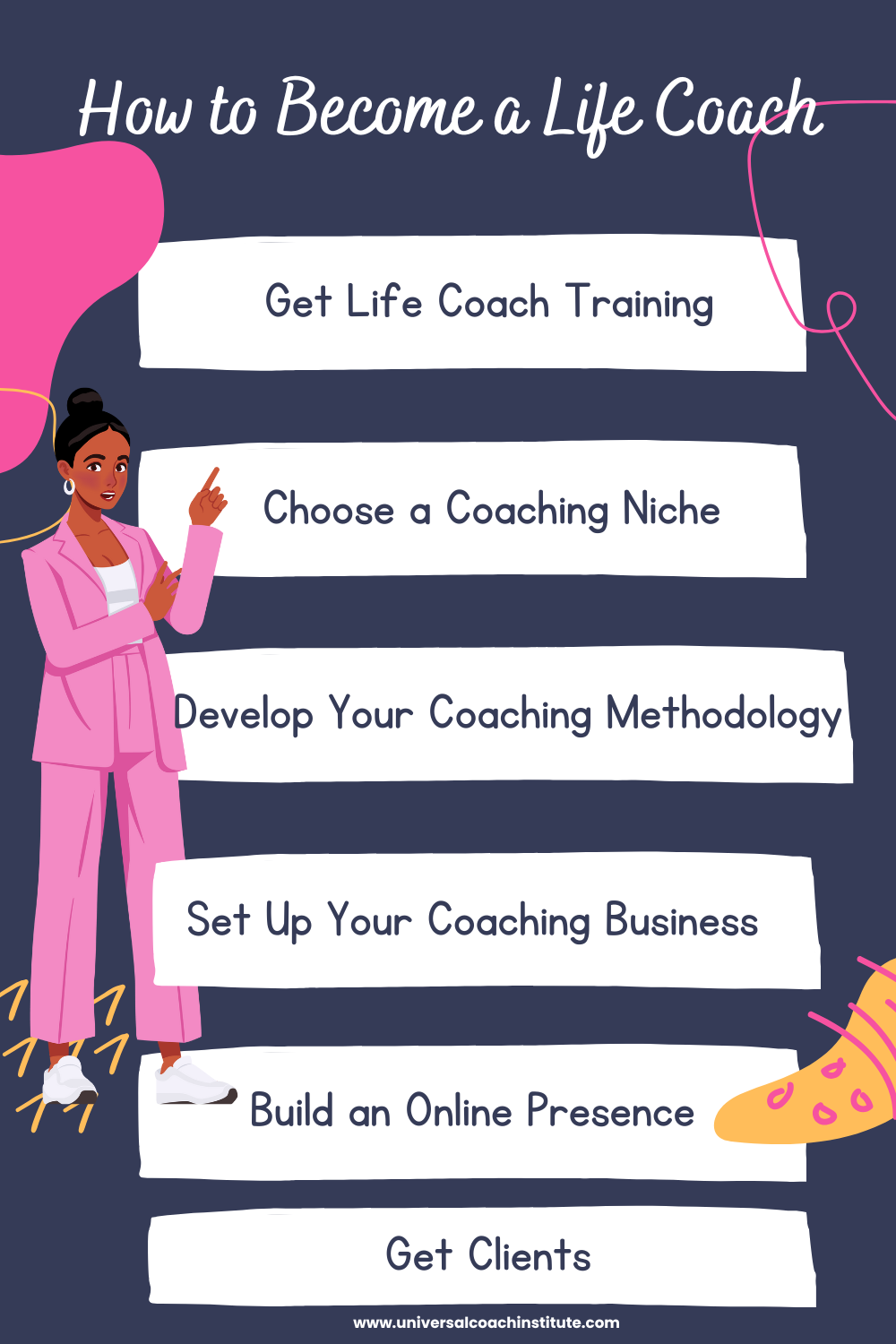To become a life coach, you must complete training, select a coaching specialization, and establish a strong coaching business model. Many aspiring coaches begin by getting a life coaching certification to build credibility and attract clients. After learning how to coach, you gain practical experience and establish your unique coaching approach.
Once you complete life coach training, the next step is to develop your signature coaching style and define your ideal coaching client. A career coach may work with professionals navigating job changes, while a mindset coach helps individuals shift limiting beliefs. Choosing the right coaching niche ensures you align with the needs of your target audience.
Many successful coaches start part-time before transitioning to full-time work. The opportunity to make a difference makes coaching an attractive career for those passionate about supporting others’ growth.
What is a Life Coach?
Before you start your coaching journey, it’s important to understand what a life coach does. It’s also important to understand how coaching differs from therapy or consulting. Let’s break it down.
A life coach is a professional who helps individuals reach their personal and professional goals. They provide guidance, support, and accountability as they work toward positive changes in their life.
Life coaches differ from therapists. While therapists focus on healing past trauma, life coaches concentrate on the present situation and future aspirations. They don’t diagnose mental health conditions or treat psychological disorders.
A life coach acts as an accountability partner. They ask powerful questions to help clients gain clarity about their goals and the obstacles that may be holding them back.
Life coaches work in various areas, including career development, relationships, wellness, and personal growth. Some specialize in specific fields like nutrition, spirituality, or executive coaching.
The coaching relationship is built on trust and confidentiality. A life coach creates a safe environment to explore your thoughts, feelings, and ambitions without judgment.
Coaches use different techniques to help clients discover their full potential. These may include setting SMART goals, creating action plans, and developing new habits and mindsets.
Unlike consultants who provide expert advice, life coaches believe you have the answers within yourself. Their job is to help clients uncover those answers through guided conversations and reflective exercises.
Professional coaches follow ethical guidelines and often have certification from recognized coaching organizations. Many undergo extensive training in coaching psychology and communication skills.
The ultimate goal of life coaching is to empower individuals to live their best lives on their terms.
Now that you understand what life coaches do, you might wonder—can anyone become a life coach? Do you need specific qualifications? Let’s explore who is best suited for this profession.
Who Can Become a Life Coach?
Anyone with a passion for personal development or guiding others through change can become a successful life coach. Many coaches transition from backgrounds in teaching, psychology, business, and counseling. You don’t need specific academic credentials or a particular professional background to enter this field.
The most important qualification is your genuine desire to help others achieve their goals. Your life experience, whether overcoming challenges or reaching personal milestones, can be valuable in guiding clients.
Strong communication skills are essential. You need to listen actively, ask powerful questions, and communicate clearly with your clients.
Key personality traits for successful life coaches include:
- Empathy
- Patience
- Curiosity
- Optimism
- Accountability
While certification isn’t legally required, obtaining credentials from recognized coaching programs adds credibility to your practice. Many clients prefer working with certified coaches.
Your coaching mindset should focus on possibility and growth. Rather than giving advice, you’ll help clients discover their own solutions.
Previous experience in mentoring, teaching, or leadership roles can provide a solid foundation for your coaching career. However, even without this background, dedicated training can help you develop the necessary skills.
Remember that your personal growth journey continues as you help others with theirs. The best coaches commit to ongoing learning and development throughout their careers.
Now that you know what it takes, let’s look at the exact steps to becoming a certified life coach. Whether you choose certification or self-study, here’s how to get started.
Step-By-Step Guide To Becoming a Life Coach
Becoming a life coach requires specific training, knowledge development, and business skills. The journey involves finding your specialty, getting educated, and building your practice.
1. Define Your Coaching Niche
Start by identifying your coaching specialty. A niche makes you stand out in the crowded coaching market.
Think about your personal strengths, experiences, and passions. Could you help with career transitions, relationships, or wellness goals? Maybe you connect well with certain groups like executives, parents, or young professionals.
Research “market demands” to ensure your niche has potential clients. What problems do people need help solving?
Your niche should balance your expertise with market opportunity. For example:
- Career transition coaching
- Relationship coaching
- Health and wellness coaching
- Financial success coaching
- Executive leadership coaching
Having a clear niche helps you develop targeted expertise and attract ideal clients who need exactly what you offer.
2. Get Proper Training And Education
While no specific degree is required to become a life coach, proper training is essential. Look for programs that provide comprehensive coaching skills.
Training options include:
- Online coaching courses
- Self-paced and self-study
- Live online coach training
- In-person workshops and seminars
Good training programs cover:
- Core coaching competencies
- Ethics in coaching
- Communication techniques
- Goal-setting frameworks
- Powerful questioning methods
Training hours vary but expect to invest 20-60 hours in basic certification. More advanced credentials require additional training and experience.
Choose programs offering practice opportunities with feedback. This practical experience is invaluable for developing your coaching skills.
3. Gain Coaching Experience
Theory alone won’t make you an effective coach. You need practical experience working with real people on real challenges.
Start by offering free or reduced-rate sessions to friends, family, or colleagues. Ask for honest feedback after each session to improve your approach.
Consider finding a mentor coach who can supervise your work. Their guidance helps you refine your techniques and handle difficult situations.
You may also consider creating practice groups to coach peers and receive coaching. This gives you experience from both sides of the coaching relationship.
Set clear learning goals for your practice sessions:
- Improving your listening skills
- Perfecting powerful questioning
- Developing your intuition
- Building confidence in your approach

4. Get Certified (Optional But Recommended)
Certification isn’t legally required, but it adds credibility and shows your commitment to professional standards. Universal Coach Institute (UCI) provides comprehensive life coach certification training. We equip you with the skills to coach effectively and launch your practice.
At UCI, certification includes:
- Life Coach Certification
- Our ICF Approved Solution-Focused Coach Certification
- Structured training to develop essential coaching skills
- Practical experience through hands-on coaching exercises
- Coaching tools and frameworks to guide your clients
- A streamlined certification process designed for aspiring and practicing coaches
For those pursuing ICF certification, the process requires:
- Completing accredited training
- Logging specific coaching hours
- Working with a mentor coach
- Passing a knowledge exam
- Demonstrating coaching skills
How Long Does It Take to Become a Life Coach?
The time it takes to become a certified life coach depends on the training program you choose. It can take a few weeks to a year. UCI’s life coach training is designed to be completed in 12 weeks. However, some people finish much sooner.
UCI offers a flexible and structured approach. We allow you to gain certification efficiently while focusing on real-world coaching skills.
5. Develop Your Coaching Methodology & Tools
Create your unique coaching approach based on your training and personal style. This becomes your coaching “signature.”
Essential coaching tools to develop:
- Initial assessment questionnaires
- Goal-setting frameworks
- Progress tracking systems
- Session structures
- Accountability methods
- Homework assignments
Adapt proven coaching models to fit your style. Popular frameworks include GROW (Goals, Reality, Options, Way Forward), SMART goals, and Appreciative Inquiry.
Build a toolkit of exercises and activities for different client needs. Having various options helps you customize your approach.
Develop clear coaching agreements outlining expectations, boundaries, and confidentiality. Professional documents show clients you take your work seriously.
Your methodology should be flexible enough to adapt to different clients while maintaining a consistent approach.
6. Set Up Your Coaching Business
As a life coach, you’re also a business owner. Set up your business properly from the start.
Choose a business structure (sole proprietorship, LLC, etc.) and register your business name. Consult with an accountant about tax implications.
Also, while life coaching is unregulated, some cities may require a business license if you operate a coaching business. Coaches who offer career consulting, health coaching, or financial coaching may need to check state regulations.
Create essential business documents:
- Coaching contracts
- Payment policies
- Cancellation policies
- Confidentiality agreements
Set your pricing strategy based on:
- Your experience level
- Your target market
- Session length and frequency
- Package offerings
Decide on your session delivery methods (in-person, phone, video calls) and scheduling system. Many coaches use online booking platforms.
Establish professional boundaries around availability, communication between sessions, and scope of services. Clear boundaries prevent burnout.
Consider business insurance to protect yourself professionally.
7. Build An Online Presence & Brand
Your online presence is often a client’s first impression. Make it count.
Create a professional website showcasing:
- Your coaching philosophy
- Your niche and expertise
- Your services and packages
- Client testimonials (as you gather them)
- Your credentials and background
Develop a consistent brand identity with a logo, color scheme, and messaging that reflects your coaching style.
Start building your social media presence on platforms where your ideal clients spend time. Share valuable content related to your coaching niche.
Consider starting a blog, podcast, or YouTube channel to demonstrate your expertise and attract potential clients.
Create a professional email address with your business name rather than using a personal account.
Your brand should communicate not just what you do, but how you help transform clients’ lives.
8. Get Clients & Market Your Coaching Business
Finding clients requires consistent marketing efforts and relationship building.
Effective marketing strategies for coaches:
- Offering free discovery sessions
- Speaking at events
- Running workshops or webinars
- Creating valuable free content
- Networking with complementary professionals
- Using social media strategically
- Getting testimonials from satisfied clients
Focus on communicating benefits, not just features. Don’t just say, “I offer six coaching sessions.” Instead, say, “I help you clarify your purpose and create actionable steps toward your goals.”
Track your marketing efforts to see what works best for attracting your ideal clients.
Consider creating a referral program to encourage satisfied clients to recommend you.
Remember that marketing is about building relationships, not just making sales pitches. Approach it with authenticity and a genuine desire to help others.
Once you’ve completed training and started your coaching business, the next question is: How much can you actually earn as a life coach? Your income potential depends on your niche, experience, and pricing strategy. Let’s explore what to expect.
How Much Do Life Coaches Make?
Life coach salaries vary widely based on experience, specialization, and business model. Most life coaches earn between $30,000 and $100,000 annually, with top coaches making well into six figures.
Beginning coaches typically charge $50-$100 per hour, while experienced coaches command $150-$300+ per hour. Your pricing can increase as you build a reputation and demonstrate results with clients.
Factors affecting your coaching income:
- Experience and credentials
- Specialization (career, health, relationship coaching)
- Geographic location and target market
- Marketing effectiveness
- Business model
Many coaches use package pricing rather than hourly rates. A common approach is offering 3-month packages ranging from $1,500 to $5,000, depending on session frequency and additional resources.
Revenue streams for life coaches:
- One-on-one coaching sessions
- Group coaching programs
- Online courses (passive income)
- Speaking engagements
- Books and digital products
- Corporate training
Building a six-figure coaching business typically requires diversifying beyond just individual sessions. Group coaching programs allow you to serve more clients simultaneously, increasing your hourly value.
Full-time coaches with 2+ years of experience often earn $70,000-$100,000 annually. However, your income potential largely depends on business skills like marketing and client retention, not just coaching ability.
The ROI for coaching clients is typically high. This allows you to charge premium rates when you can demonstrate clear value and results.
While many life coaches build successful careers, some struggle to attract clients or set profitable rates. Let’s look at common mistakes new coaches make and how to avoid them so you can build a thriving business.
Common Mistakes New Coaches Make (And How To Avoid Them)
Starting a coaching business can be exciting, but there are pitfalls to watch for. Many new coaches make similar mistakes that can slow their progress or impact their success.
- Trying to help everyone is a common error. Without a clear niche, your marketing message becomes vague. Focus on a specific audience where your expertise truly shines.
- Undercharging for services hurts your business long-term. Research market rates and set prices that reflect your value, even if you’re just starting.
- Inconsistent client acquisition. Many coaches struggle with inconsistent client acquisition. Create a simple marketing plan and stick to it, rather than trying random tactics when clients are scarce.
- Imposter syndrome affects most new coaches. Remember that you don’t need to know everything—your role is to facilitate growth through powerful questions and reflections.
- Neglecting your own development can stunt your coaching effectiveness. Invest in continuous learning through books, courses, or mentorship to sharpen your skills.
- Giving advice instead of coaching. Some coaches fall into the trap of giving advice instead of coaching. Your job is helping clients find their own answers, not solving problems for them.
- Poor boundaries lead to burnout. Establish clear working hours, communication channels, and session structures from the beginning.
- Lack of reflection on your coaching sessions limits growth. Take time after each session to consider what went well and what you could improve next time.
Frequently Asked Questions
1. Do I need certification to become a life coach?
No, you don’t need certification to become a life coach since the industry is unregulated. However, obtaining a recognized certification can boost your credibility, attract more clients, and improve your coaching skills. Popular certification options include ICF-accredited programs, Solution-Focused Coaching, Positive Psychology Coaching, and other specialized training.
2. Can I become a life coach without a degree?
Yes! Unlike therapists or counselors, life coaches don’t need a degree. However, strong communication skills, emotional intelligence, and a structured coaching approach are essential. Many successful coaches take specialized training in areas like NLP, solution-focused coaching, and transformational coaching to enhance their effectiveness.
3. How much does it cost to become a certified life coach?
The cost of life coach training and certification varies widely. UCI’s life coach training is $297. Some online programs start at $500, while ICF-accredited programs can range from $3,000 to $10,000. If you’re looking for affordable certification, consider self-paced programs or online coaching academies.
4. How do life coaches get clients?
Life coaches attract clients through social media marketing, SEO blogging, networking, referral programs, and discovery sessions. Many use Instagram, YouTube, LinkedIn, and email marketing to build authority. Coaches also leverage lead magnets, free workshops, and content marketing to draw in potential clients.
5. Can I be a life coach online?
Yes! Many life coaches operate 100% online, using Zoom or similar platforms. Online coaching is ideal for those who want to work remotely or offer group coaching programs. For passive income, you can also create digital products like online courses or coaching memberships.
Final Thoughts: Is Becoming A Life Coach Right For You?
Becoming a life coach requires honest self-assessment. You need to examine your motivation, skills, and commitment before jumping in.
Ask yourself why you want to coach others. Is it the potential income, the flexible schedule, or the chance to make a meaningful impact? Your reasons will affect your approach and success.
The coaching industry continues to grow. According to MarketResearch.com, the Life Coaching market was valued at USD 1.6 billion in 2024. It is set to experience steady growth at a CAGR of 5.2% from 2025 to 2034.
Consider starting coaching as a side hustle before going full-time. This lets you test your skills and build a client base without financial pressure.
Your personal fulfillment as a coach will depend on your connection with clients. Do you genuinely enjoy helping others overcome challenges and reach their goals?
Life coaching has clear pros and cons:
| Pros | Cons |
|---|---|
| Flexible schedule | Inconsistent income initially |
| Meaningful work | Building a reputation takes time |
| Personal growth | Emotional demands |
| Low startup costs | Competitive market |
The right coach combines expertise with empathy. You don’t need to know everything, but you should be committed to continuous learning.
Take these next steps if coaching feels right for you:
- Become a Certified Life Coach
- Create a specific coaching niche
- Develop your unique approach
- Build a simple marketing plan
- Connect with other coaches for support
Successful coaches start with clarity about their own purpose. Your coaching journey should align with your personal values and strengths.
Become a Certified Life Coach Today! →



